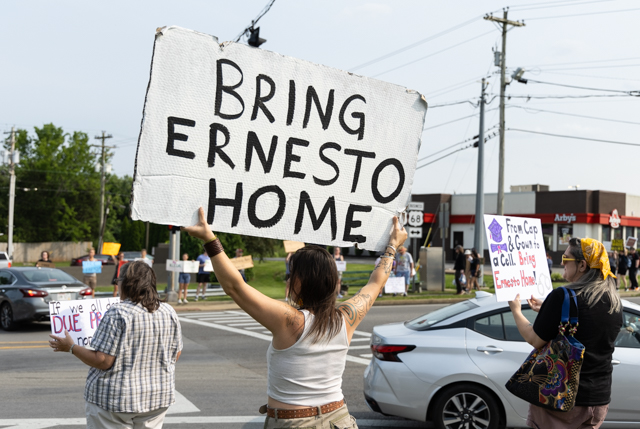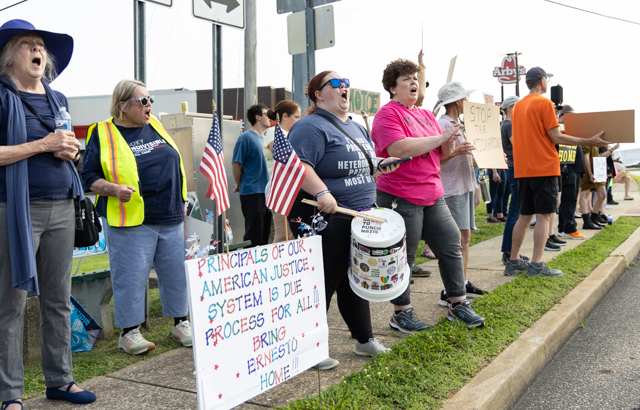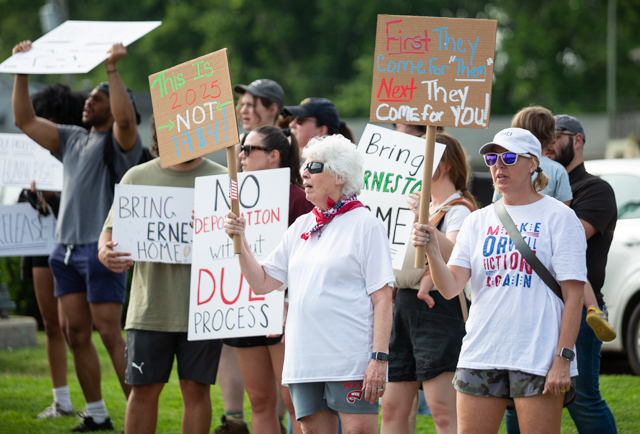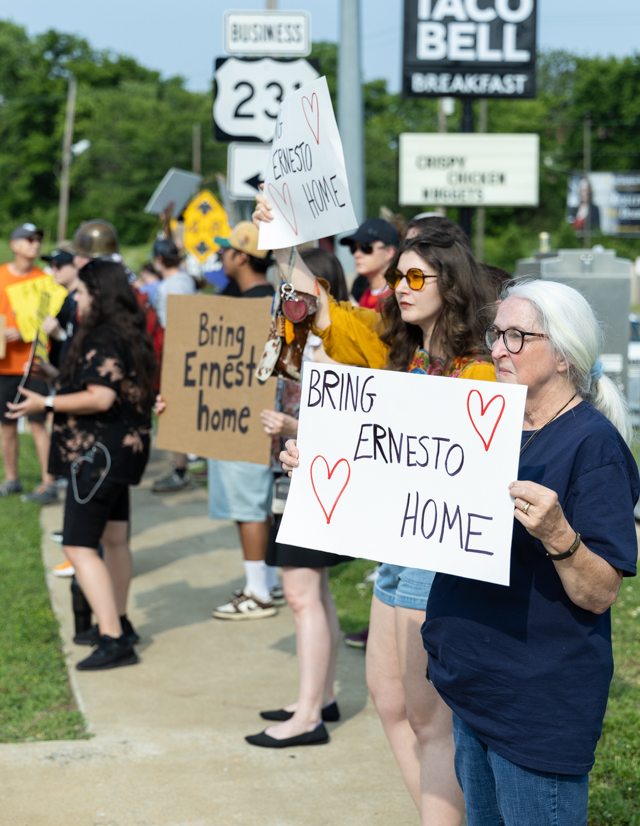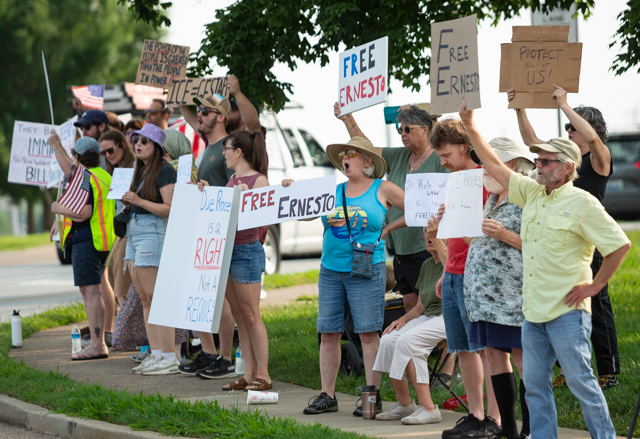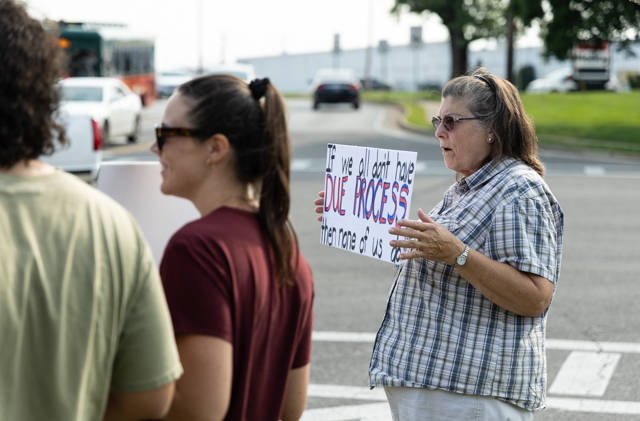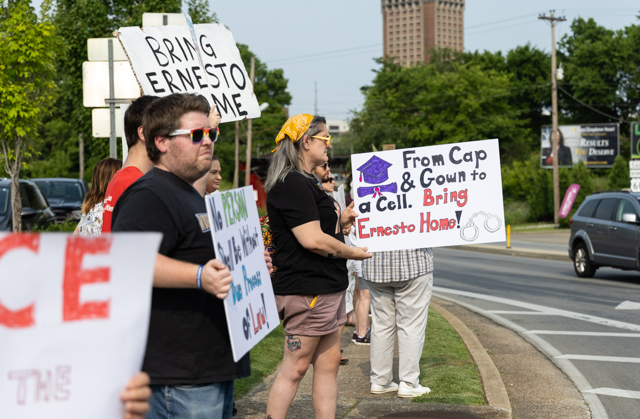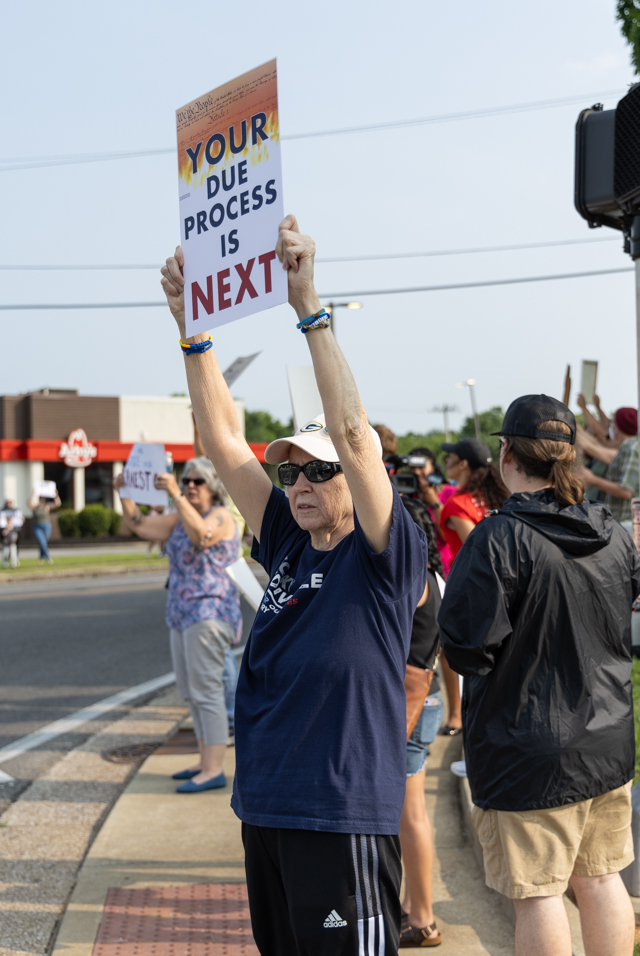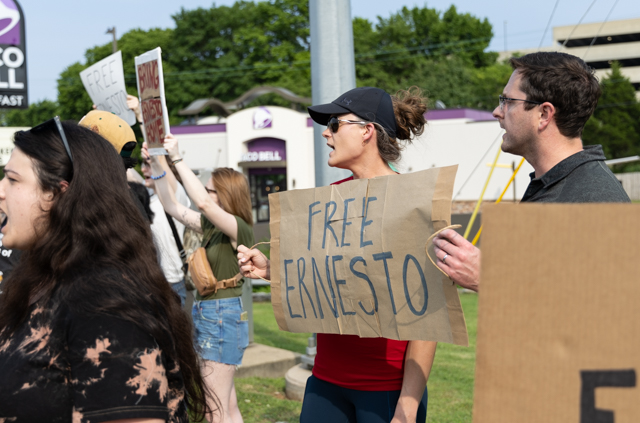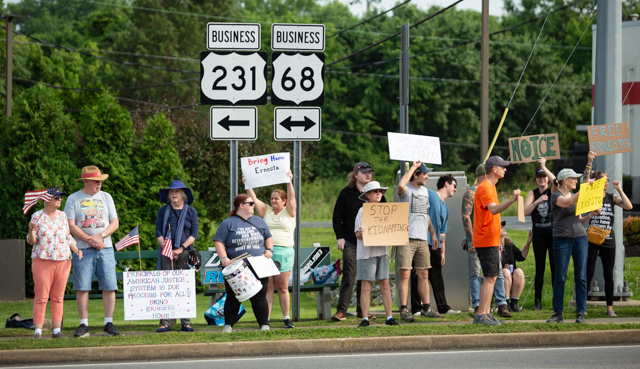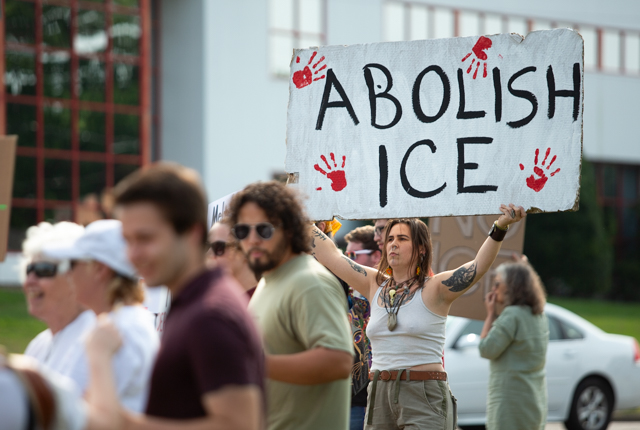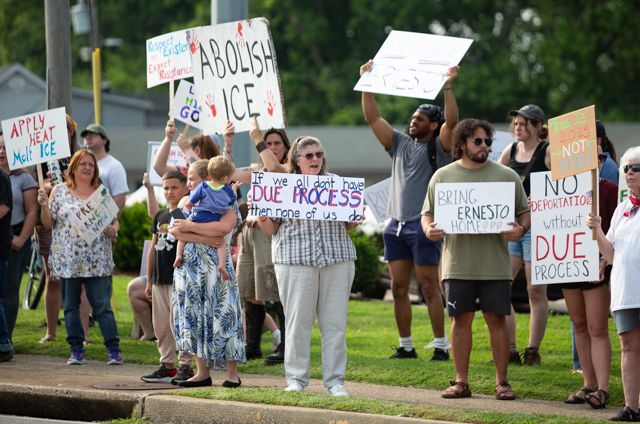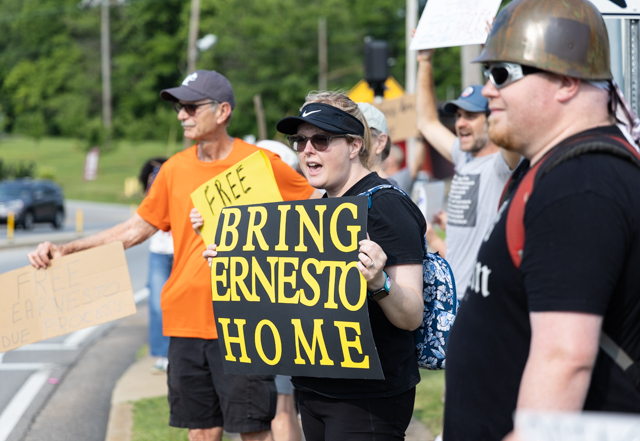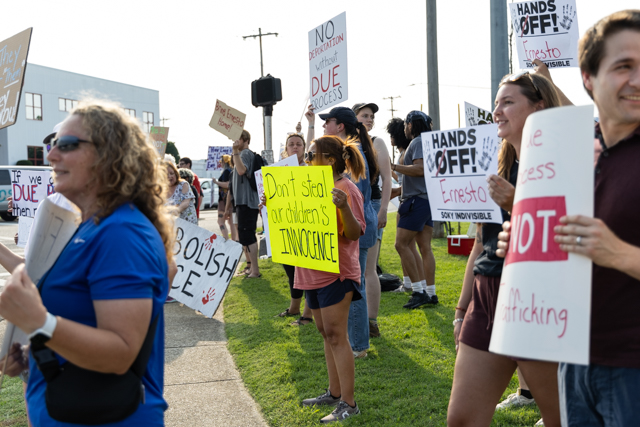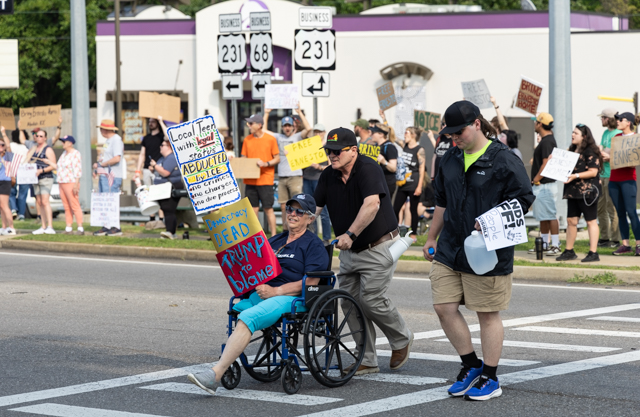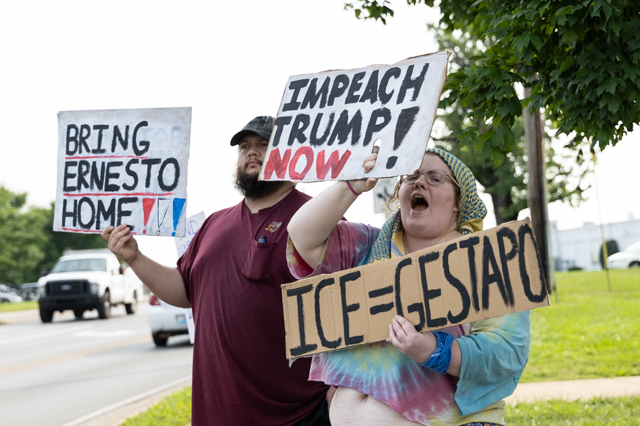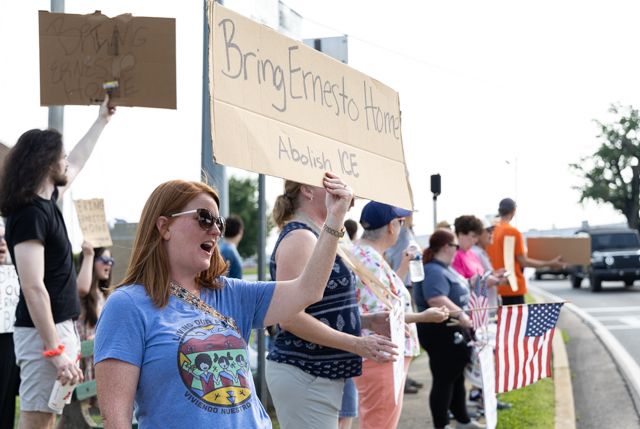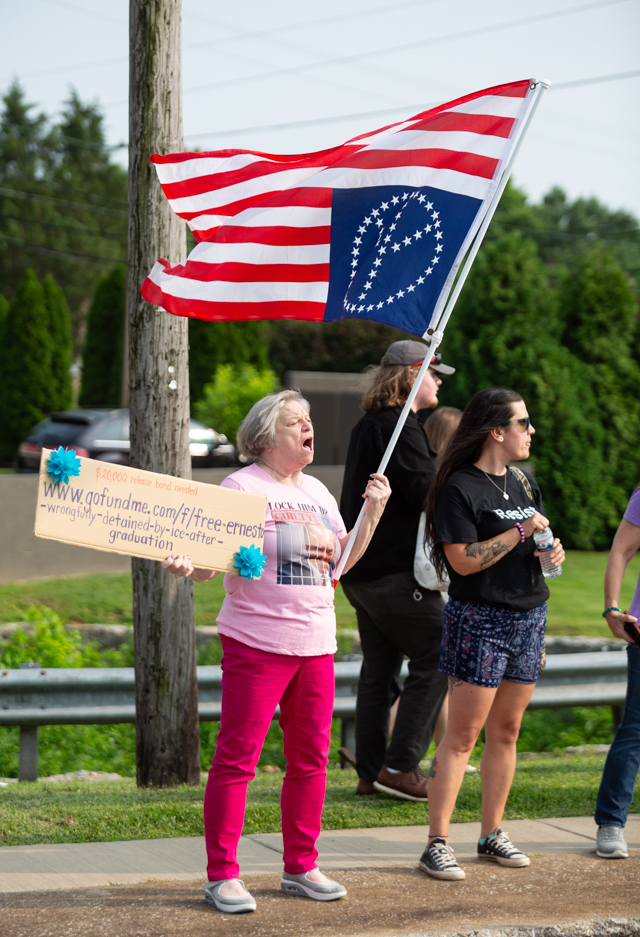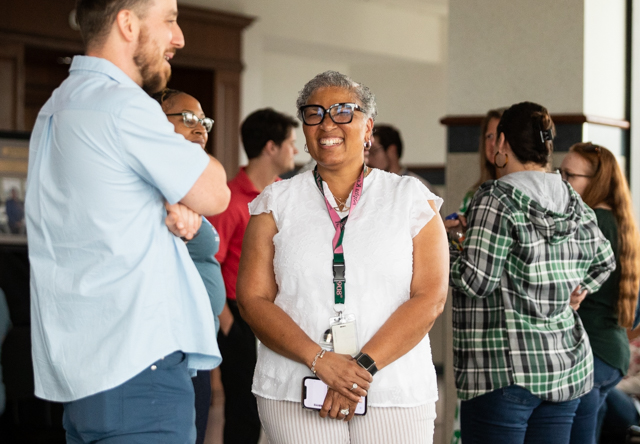Amid protests, new details emerge in case of ICE-detained teen
Published 1:54 pm Thursday, June 12, 2025





















DAVID MAMARIL HOROWITZ
david.horowitz@bgdailynews.com
Two hundred-plus rallied in Bowling Green Wednesday with chants that cut through the noisy intersection of Morgantown and Russellville roads for one individual: Bowling Green teenager Ernesto Manuel-Andres, detained June 4 despite legal authorization to be in the U.S., per his attorneys.
Trending
As of Thursday morning, the 18-year-old remained detained in Monroe, Louisiana, after ICE relocated him from two other facilities in five days, which had restricted contact with a lawyer until Monday, according to the nonprofit Fugees Family, the organization that retained the law firm.
Chants of messaging in support of Manuel-Andres, such as “Due process is the law,” “Kidnapping is illegal” and “Bring Ernesto home,” rang as drivers honked for the cause. The demonstrators raised their signs and several flags – most frequently, the American flag – as they demanded his return.
“Everybody deserves due process,” said Bowling Green City Commissioner Carlos Bailey, who, with his daughter, raised signs supporting Manuel-Andres. “(I’m) out here because he did everything right – so, just the decency of it as a human being, decency as a father.
“He was a kid. He should be still at home with his family.”
Manuel-Andres remains detained in Louisiana. Numerous developments have taken place in the several days his story gained wide traction: Manuel-Andres, after five days of detainment, got to talk to his lawyer; ICE shared a Notice to Appear with attorneys that same day; a GoFundMe to pay for a potential bond hearing surpassed its $20,000 goal in two days; city leaders individually advocated for Manuel-Andres’ due process; and, most recently, ICE is attempting to move the trial to Louisiana.
At the gas station near Wednesday’s protest, Mayor Todd Alcott, Bowling Green Police Department Chief Michael Delaney and Warren County Sheriff Brett Hightower kept a watchful eye on the demonstration.
Trending
“We have a peaceful protest right here (…),” the mayor said. “We’d love to have Ernesto come home. What I understand, he has the legal paperwork to do that – and if that is so, he deserves due process.”
Asked what steps Bowling Green could take to advocate for Manuel-Andres if paperwork is in order, Alcott named numerous city leaders he’d work with: the city schools superintendent, Warren County judge-executive, city council, city management team and city attorney.
“We would request information as a united team, and we’d try to help Ernesto to the best of our ability,” he said.
Charge doesn’t mention legal papers
The Daily News learned there was one charge Wednesday, per attorneys: unlawfully entering the U.S. without admission or parole.
The issue is the charge doesn’t mention Manuel-Andres’ paperwork authorizing him to be in the U.S., said Beata Leja, a principal attorney at the law firm Minsky, McCormick and Hallagan, PC.
U.S. Citizenship and Immigration Services granted him the legal classification Special Immigrant Juvenile (SIJ) – for youth who’ve survived abandonment, abuse or neglect, Leja said. In Manuel-Andres’ case, the Department of Homeland Security also granted him Deferred Action, which provides legal protection from deportation.
Manuel-Andres, from Guatemala, entered the U.S. as an unaccompanied minor and was processed into custody at the Office of Refugee Resettlement, Leja said. He was released to family members in the U.S. because a law requires children be in the least restrictive environment, she said.
Fugees Family, a national nonprofit that has advocated for refugees and immigrants for decades, had then retained the law firm to file the SIJ petition for Manuel-Andres. For this petition, a state juvenile court determines that a child is abandoned, neglected or abused, and it’s not in the child’s interest to return to their previous country – and a juvenile court in Kentucky had approved such findings, per Leja.
The law firm then filed an application with the USCIS to request the recognition that he is a Special Immigrant Juvenile – which was approved, she said.
That recognition enables an individual to sponsor themselves for a green card – permanent residency – but a limit on green card issuances per year has created a backlog of three to four years, Leja said. In these cases, she said, USCIS can grant Deferred Action – as was provided to Manuel Andres.
Deferred Action recognizes that through the four years it’s valid, a person is not a priority for removal, and it defers their removal, Leja said. While that recognition could be removed if a person engages in behavior that warrants its removal, Manuel-Andres has no criminal background, Leja said.
“It’s a protection from this very thing happening,” she said.
The SIJ classification remains valid indefinitely, while the Deferred Action protection remains valid until February 2029, she said.
The Notice to Appear, which includes the charge, “makes no mention of any of this,” Leja said.
She described the charge as inaccurate.
“They’re completely ignoring the fact that he has been granted SIJ and granted Deferred Action,” she added.
She described the detainment of a person with Deferred Action who has no criminal background as “unprecedented.”
“This is not normal behavior at all,” Leja said. “They should not be put in removal proceedings, which is exactly what’s happening right now.”
ICE motions for Louisiana trial; rumors addressed
On Thursday morning, the law firm learned that ICE filed a motion to transfer the June 18 virtual bond hearing from Indianapolis – closer to where Manuel-Andres was living and picked up – to Louisiana, Leja said.
While it could be a matter of convenience, given Manuel-Andres’ location of detainment it could also be strategic, Leja said.
The court rejects roughly 80% of those who seek asylum or other relief at the court, compared to an average of 52% nationwide, according to the Trac immigration data project.
It’s also where they’ve transferred some of the high-profile cases, like the case of Columbia student Mahmoud Khalil, she said.
The hearing will determine whether to grant him bond based on if he’s a threat to the community or a flight risk, Leja said. This, she added, would also entail his commitment to reappear in court for any subsequent hearings.
The judge holds the discretion of either releasing him outright or releasing him after he pays a bond, she said. If the judge grants bond, there’s the possibility he could be released after a day or two, she said, adding that he would sometimes have to return to court.
Leja also addressed two false rumors that have circulated surrounding the case.
One is that Deferred Action has been halted: This came about because a USCIS webpage briefly summarizes an alert “effective June 6” that can be construed as rescinding Deferred Action for Special Immigrant Juveniles such as Manuel-Andres.
However, the actual USCIS Policy Alert that expands on that brief memo states it’s about “eliminat(ing) automatic consideration of Deferred Action” for such residents – and it explicitly refutes the purported rumor, she noted:
“… aliens with current deferred action based on their SIJ classification will generally retain this deferred action, as well as retain their current employment authorization provided based on this deferred action, until the current validity periods expire,” the Policy Alert states.
Leja also addressed a rumor that people lose SIJ classification after turning 18.
This, she said, is false: “No other way to put it.”
BG Protest
The Tuesday protest was an emergency, lead organizer Cathy Severns said.
Typically, protests in Bowling Green this year are organized at least a week ahead – and with few exceptions, they haven’t gotten close to 200.
With about 24 hours’ notice, the people rallied. It was peaceful, and preceded by directions from Severns to sit down if there are counter-protesters, and not to argue with or resist police.
“We wanted to show up for Ernesto so that he knows he’s supported, and so that his family and friends know that he’s supported,” Severns said. “We also wanted to show up for the rest of the immigrant community here.
“We want them to know that they are welcome here, that we welcome our neighbors and love our neighbors, and we’re all a family.”
It’s one of more than a dozen protests held this year by the local unit of the national Indivisible movement, which typically opposes President Donald Trump’s political agenda. However, while that sentiment was largely present – as many advocated for immigrants and against ICE – there was a sense of unity across the political spectrum: one surrounding due process, as ICE ramps up detainments nationwide.
The GoFundMe for Manuel-Andres, which had initially aimed solely to afford the potential cost of posting bond, had raised $22,880 by Thursday morning. (It was updated to detail where unused donations may go.)
“We Americans have lots of rights given to us by the Constitution,” Bowling Green resident Randy Benjamin said. “Our current government, the president, are stomping on our basic rights. So, I feel the need to come out and stand and raise my voice. I’m only one dude, but a whole bunch of dudes come together, and that makes a movement.”
Numerous residents of Bowling Green and the greater area attended, including teachers from the school Manuel-Andres had attended for years prior to his May graduation.
Leslie Perkins, a retired former teacher of Manuel-Andres, described the teen as kind, smart, hardworking and respectful.
She recalled a day in class where kids were joking around, and Manuel-Andres, for once, joined in. Perkins said she took him outside after and told him she noticed he wasn’t as focused as he needed to be.
“He got a tear in his eye. He’s like, ‘I’m so sorry, Miss Perkins. It will never happen again,’ ” she said. “And it did not.
“That’s the kind of kid Ernesto is.”
While Alcott and Delaney weren’t active in the protest as they watched nearby, the two showed support for due process.
“I firmly believe that due process must remain a cornerstone of our justice system,” Delaney wrote in a statement. “If we undermine this principle, we risk eroding the very values upon which our nation is built.”
Added Alcott, “I know there’s a lot of unknowns right now, but due process is an important process … and I do believe that can happen, and I will stand up and advocate for that, for our community.”
Alan Smith, a nurse, said that in addition to supporting Manuel-Andres, he has worries that ICE will show up for one of his patients.
“I felt like this is something I could do to come out and say that this is wrong, and he has a home here in Bowling Green,” he said. “And this was not right, and everyone should be scared that this could happen to someone here legally.”
Demonstrator Angela Hess expressed concern for a good friend who’s an immigrant that she met more than a decade ago.
“What they’re doing is illegal, and they’re taking away, to me, our future … Our country needs immigrants,” she said.
“We’ve got to bring kindness back into this world again.”
Bowling Green Commissioner Dana Beasley-Brown, who showed up to advocate for Manuel-Andres, said she had reached out to U.S. Sen. Mitch McConnell and Rep. Brett Guthrie.
“(Manuel-Andres’) detention is not just a personal tragedy – it is a violation of the fundamental constitutional rights that protect all of us,” Beasley-Brown stated. “Here in Bowling Green, we take those principles seriously ….
“Today we stand with Ernesto and others who have had their rights violated here in Bowling Green,” she said. “Because that is who we are – we take care of each other, and we are standing together making sure that no one is held without cause, and that all of our neighbors are protected by the Constitution.”
ICE didn’t respond to questions by press time, adding that more information about a detainee is typically needed to provide more details.


